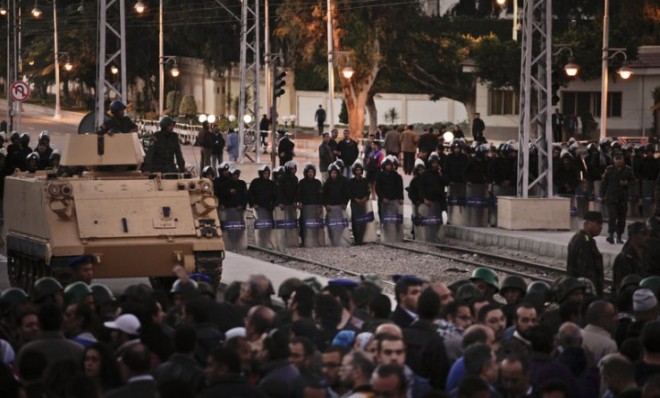Mohamed Morsi's concessions: Crisis averted in Egypt?
Egypt's president gives up newly declared powers to pacify his liberal-secular opponents, but it may not be enough


A free daily email with the biggest news stories of the day – and the best features from TheWeek.com
You are now subscribed
Your newsletter sign-up was successful
Hours after meeting with a handful of political opponents on Saturday, Egyptian President Mohamed Morsi acceded to one of the opposition's key demands, apparently rescinding most of his controversial Nov. 22 decree granting himself sweeping, unchecked powers. But Morsi refused the other ultimatum: That he postpone a referendum next Saturday on the country's draft constitution, drawn up by Morsi's Islamist backers. In fact, Egypt's state media suggested that Morsi was moving toward declaring martial law to ensure that the vote happens after days of sometimes-violent protests. The loosely knit opposition appeared confused and split by Morsi's big half-measure, but the largest group, the secular-Christian-liberal National Salvation Front — which boycotted Saturday's Morsi meeting — called for huge anti-referendum protests on Tuesday. Is Egypt's push for democracy any closer after Morsi's sizable concession?
Morsi just made things worse: The president's big concession, scrapping his near-dictatorial powers, isn't enough without also putting off the upcoming referendum, say the AFP's John Davison and Hassan El Fekih. Opponents see the draft document "as a tool weakening human rights, the rights of women, religious minorities, and the judiciary's independence," and their increasing militancy means they don't think they have the votes to stop the constitution at the ballot box. "There is a risk of vicious further clashes" before Saturday's referendum, and a protracted crisis if Morsi's constitution prevails.
"Mass rival rallies called in Egypt as crisis sharpens"
The Week
Escape your echo chamber. Get the facts behind the news, plus analysis from multiple perspectives.

Sign up for The Week's Free Newsletters
From our morning news briefing to a weekly Good News Newsletter, get the best of The Week delivered directly to your inbox.
From our morning news briefing to a weekly Good News Newsletter, get the best of The Week delivered directly to your inbox.
Egypt is calming down: Actually, "Morsi's partial climb down may already be paying dividends," says Matthew Fisher of Canada's Postmedia News. Instead of last week's tens of thousands of protesters, only a few hundred turned out Saturday night and Sunday. At the very least, "Morsi may have bought himself some time" by convincing "some of the less-committed secular protesters" that this is the best deal they're going to get. What's painfully clear, though, is that "neither side has any idea about what responsibilities and behavior is expected in democratic societies."
"President buys himself some time"
We're a long way from stability: Egypt is simply working through "a completely predictable and probably protracted struggle for power," like all post-revolutionary societies, says Stephen Walt at Foreign Policy. Even in the "comparatively benign" American revolution, it took more than a decade of bitter squabbling and jockeying to get from the Declaration of Independence to the Constitution, and we had to scrap our first-draft effort, the Articles of Confederation, along the way. "Unless the 'Arab spring' is quite atypical," Egypt won't get its act together for several years, and the best thing we can do is "show enormous patience and a very light touch" while they figure it out.
"Egypt and beyond: The need for patience"
A free daily email with the biggest news stories of the day – and the best features from TheWeek.com
Peter has worked as a news and culture writer and editor at The Week since the site's launch in 2008. He covers politics, world affairs, religion and cultural currents. His journalism career began as a copy editor at a financial newswire and has included editorial positions at The New York Times Magazine, Facts on File, and Oregon State University.
-
 The problem with diagnosing profound autism
The problem with diagnosing profound autismThe Explainer Experts are reconsidering the idea of autism as a spectrum, which could impact diagnoses and policy making for the condition
-
 What to know before filing your own taxes for the first time
What to know before filing your own taxes for the first timethe explainer Tackle this financial milestone with confidence
-
 The biggest box office flops of the 21st century
The biggest box office flops of the 21st centuryin depth Unnecessary remakes and turgid, expensive CGI-fests highlight this list of these most notorious box-office losers
